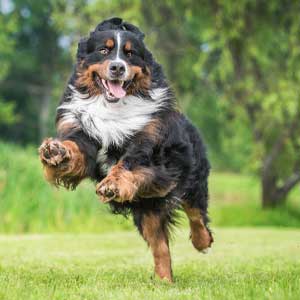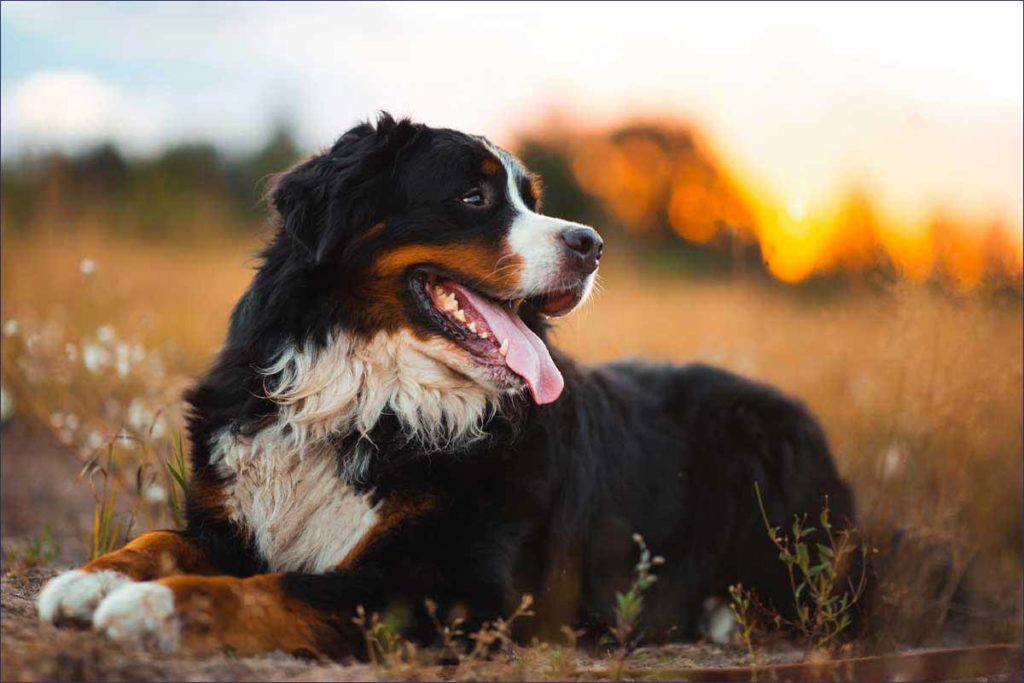Traditionally bred as all-purpose farm dogs, Bernese Mountain Dogs are known for their sturdy builds and immense strength. They are incredibly affectionate and social companion dogs who love to spend time with their families. If you are considering bringing a Berner into your family, it is important to understand their unique personalities, potential health concerns, and grooming and exercise needs.
Table of contents
History
These large, sturdy dogs hail from the agricultural midland region of Switzerland, mostly around the city of Bern. According to the Bernese Mountain Dog Club of America (BMDCA), Berners played a central role as farm dogs in an area known for dairy production. They were traditionally bred for driving cattle, accompanying cows to pasture, guarding farmyards, and serving as companions for farmers and their families. With their broad builds, Berners also have the ability to pull loads many times their own weight, making them valuable all-purpose farm dogs.
By the late 1800s, the numbers and quality of Bernese Mountain Dogs were dwindling in Switzerland. In 1907, however, breed enthusiasts formed a Swiss breed club. Berners soon became popular companion pets in Swiss households. In 1926, the breed was brought to the United States and caught on quickly, according to the American Kennel Club (AKC). The AKC registered its first Berner in 1937.
Size and appearance
Bernese Mountain Dogs are considered large-sized dogs. They are big, powerful, and built for hard work. With regards to appearance, the coloring of Berners’ thick, silky coat is tricolored—primarily black with distinctive white and rust markings on the chest, limbs, and face.
- Male Berners typically stand about 25 to 28 inches tall and weigh between 80 and 115 pounds.
- Females are slightly smaller, about 23 to 26 inches tall and between 70 to 95 pounds in weight.
Grooming
Berners’ moderate-length double coat consists of a longer outer coat and a woolly undercoat. This breed is not for families with allergies or those opposed to fur all over the house. Berners shed a considerable amount, and even more so during shedding seasons twice a year. Weekly brushing may need to be increased to daily brushing during periods of heavy shedding. This will minimize mess and keep your dog looking and feeling their best.
Activity level

These working dogs need exercise to stay mentally and physically fit. Breed experts from BMDCA note that they require a minimum of 30 minutes of moderately vigorous exercise each day. Tapping into their breed instincts, most Berners love pulling carts and often excel in physical competitions.
While Bernese Mountain Dogs are meant to live indoors with their human family, they enjoy outdoor activities and make great hiking and adventure buddies. It is important to note that while these dogs are built for colder weather and love the snow, their dark, thick coats make them susceptible to overheating. Time outside in warmer weather should be limited and include water for hydrating and cooling off.
Health
Bernese Mountain Dogs are generally healthy dogs, and responsible breeders screen for common health conditions in efforts to improve the breed’s overall health. According to AKC, the average lifespan for healthy Berners is between seven and 10 years. Some common health issues for the breed include:
- Cancer – Unfortunately, cancer is common in the Bernese Mountain Dog breed. The BMDCA notes that two forms of cancer are particularly prevalent—Mast Cell cancer and Histiocytic Sarcoma cancer.
- Stomach – According to AKC, all large breeds are susceptible to bloat, a sudden, life-threatening stomach condition. Also known as gastric dilatation-volvulus (GDV) complex, bloat involves the stomach rapidly filling with gas, preventing blood from the hind legs and abdomen from returning to the heart. This can send the dog into shock and be fatal. Experts at Preventative Vet recommend feeding your dog smaller portions and using slow-feeder bowls to discourage your dog from scarfing down water and food.
- Eyes – Eye conditions including cataracts, entropion and ectropion, and progressive retinal atrophy often affect Bernese Mountain Dogs. The BMDCA urges owners to have their dog’s eyes checked by a canine ophthalmologist throughout their pet’s life.
- Joints – Like many large breeds, Bernese Mountain Dogs are particularly susceptible to developing joint discomfort from wear and tear on their bodies. Owners should pay special attention to their dog’s hips and elbows. Joint discomfort and obesity can be a dangerous combination for big dogs and often make the other issue worse. Regular exercise and a healthy diet are important considerations for this breed to stay fit and keep joints healthy.
How can ElleVet’s CBD + CBDA help Berners’ joint discomfort?
CBD + CBDA is effective in helping Bernese Mountain Dogs find relief for the joint discomfort that often plagues large breeds. ElleVet’s CBD + CBDA chews, soft gels, and oils can offer support for Berners’ mobility issues and keep these dogs active well into their later years. Addressing physical discomfort can lead to improved overall well-being. And we all want a happy pup!
Personality
Bernese Mountain Dogs are known for their incredibly sweet, affectionate nature. They also tend to be very easy-going and mellow, an ideal companion dog who can go with the flow. Accustomed to working and living closely with their people, Berners are eager to please their humans and typically get along with the entire family, including other pets. They are extra gentle and tolerant with children, making them excellent dogs for families with little ones.
With a strong build and confident stature, Berners are imposing but not threatening. Traditionally bred as companions and watchdogs, they are generally protective but not aggressive, and are usually aloof and either welcoming or indifferent to strangers. These dogs are known for having a stubborn streak.
Berners are not prone to many behavioral problems like excessive barking or destructive chewing. Any behavior issues that may occur often take place when these family-oriented dogs are left alone for extended periods of time.
Training
Early socialization and obedience training are essential for large dogs, including Bernese Mountain Dogs. These gentle giants can be bigger and stronger than they realize, making behaviors like leash pulling and jumping to greet people all the more problematic. Basic training will go a long way towards helping these dogs be the best companions possible for the people they love.
Berners are intelligent and eager to please, making them usually very easy to train. They are also affectionate and sensitive, however, so positive reinforcement training methods work far better than harsh corrections and punishment. Bernese Mountain Dogs are highly versatile dogs, thriving wherever they can interact with people. They are known to make excellent therapy dogs.
Bottom line on Berners
Overall, Bernese Mountain Dogs are wonderful family dogs full of love and affection. Owners should keep their Berners on a healthy diet and regular exercise regimen, as these dogs are prone to developing joint issues that are likely to lead to mobility challenges and discomfort. Berners are intelligent and easy-going, and love nothing more than spending time with their people.









